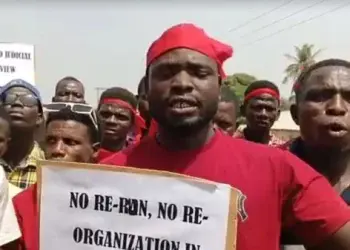More than 1000 individuals recruited into Ghana’s security services have been disqualified and removed from posts across various agencies following an extensive government audit that uncovered widespread irregularities in recruitment procedures conducted before and after the December 2024 general elections.
The announcement was made by the Minister for the Interior, Mr. Muntaka Mohammed-Mubarak, on Monday, July 14, 2025, during the inaugural session of the Government Accountability Series held in Accra.
The removals affect personnel from the Ghana Police Service, the Ghana Immigration Service, and the Narcotics Control Commission.
Security services hit by disqualifications
According to Mr. Muntaka, the audit reviewed records of about 5,200 new recruits across the security sector and uncovered numerous instances where basic entry requirements were not met.
“We were able to get out about 320 who were not supposed to be there,” he said, specifically referring to the Ghana Police Service. “Some were in their forties, diabetic, and medically unfit, but they were picked. We had to explain to them that with their situation, they could not remain in the service.”
The breakdown of disqualifications includes 320 recruits from the Ghana Police Service, 730 from the Ghana Immigration Service, and 50 from the Narcotics Control Commission
The Interior Minister confirmed that all affected individuals were notified in writing, with reasons for their removal clearly explained.
Recruitment irregularities tied to election period
The review, Mr. Muntaka said, was prompted by public concerns and parliamentary allegations of politically motivated recruitments in the final months of the previous administration.
In August 2024—just months before the December elections—several recruitment adverts were issued, raising suspicions within civil society and among opposition lawmakers about the fairness of the process.
The Minority in Parliament accused the former government of fast-tracking political party loyalists into sensitive national institutions.
“There were serious concerns that some people were slipped into the services without meeting the minimum standards,” Mr. Muntaka explained.
Glaring deficiencies found among recruits
The minister cited several alarming examples uncovered during the vetting process, including cases of individuals who were significantly over the age limit or suffered from chronic medical conditions.
He also revealed a particularly disturbing case in which a sitting Member of Parliament intervened on behalf of a relative who had nearly completed training, only for it to be discovered that the individual had not passed a single subject in the Senior Secondary School Certificate Examination (SSSCE).
“They called and said the person didn’t pass SSSCE, didn’t even record one subject,” Mr. Muntaka said. “Once you don’t meet the basic qualification, you have to go.”
New guidelines to restore integrity and fairness
To prevent future irregularities, the Interior Minister announced a comprehensive overhaul of recruitment protocols within the security services.
This includes new guidelines that clearly differentiate between officer positions and technical or support roles.
“I know people who went to vocational school and became dressmakers. The services need them to sew uniforms,” he noted. “But they must know they’re being recruited as artisans, not officers.”
Future recruitment notices, he said, will explicitly state the job category—whether for artisans like drivers, cooks, or painters—alongside academic and technical qualification requirements.
This, he explained, would ensure clarity, discourage abuse of the system, and rebuild public confidence in the transparency of enlistment into Ghana’s security agencies.
Public trust and institutional reform at stake
Since the 2024 general elections, Ghana’s security institutions have faced intense scrutiny over allegations of political interference and falling recruitment standards.
Concerns that so-called “party foot soldiers” had been covertly enlisted during the transition period triggered renewed calls for reform and depoliticisation of the sector.
The latest audit is one of the most far-reaching recruitment reviews in recent memory. For Mr. Muntaka and the Interior Ministry, the objective is clear: to restore the professionalism, credibility, and operational integrity of Ghana’s frontline security services.
“We are not only correcting past wrongs,” he stressed, “we are building a system where merit, discipline, and fairness define who gets to wear the uniform.”












